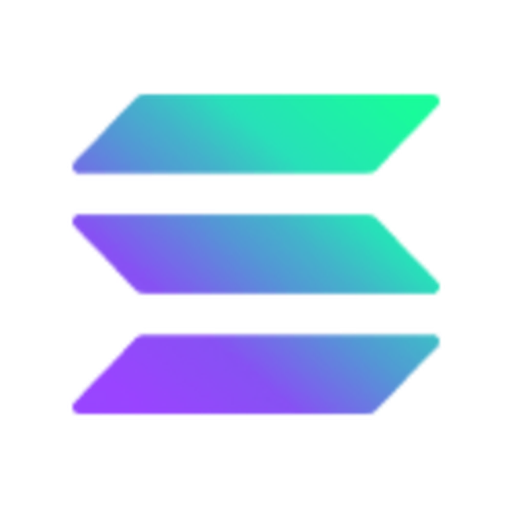Solana vs Ontology – Price, Market Cap & Performance Compared
Which coin performs better – Solana or Ontology?
We compare the current price (211.95 $ vs 0.12589 $), market cap (115 139 188 576 vs 115 221 507) and all-time high (293.31 vs 10.92).
Find out which one stands out right now!
Solana is currently trading at 211.95 $, while Ontology stands at 0.12589 $. These cryptocurrencies differ not only in price but also in market presence.
The market cap of Solana is around 115 139 188 576, and Ontology has about 115 221 507. Their respective all-time highs are 293.31 for Solana and 10.92 for Ontology.
Daily trading volume and the 24h price change (-1.06296 % vs 1.60202 %) also offer key insights.
Compare all metrics now and see which coin fits your investment strategy best!
Solana
Solana is an advanced blockchain platform that has quickly gained traction due to its high-speed and low-cost transactions. Its architecture is designed to handle thousands of transactions per second, which positions it as a strong competitor in the decentralized finance space. As developers continue to build on its network, Solana is poised to support a diverse range of applications, making it a significant player in the cryptocurrency ecosystem.
more informationOntology
Ontology is rapidly gaining attention for its unique approach to creating a decentralized identity framework and a robust ecosystem for building decentralized applications. By focusing on interoperability and scalability, Ontology aims to bridge the gap between traditional business environments and blockchain technology, making it accessible for enterprises. Its dual-token system provides flexibility and incentivizes participation within its growing community, positioning Ontology as a significant player in the evolving landscape of digital assets.
more information

|

|
|
|
|
General Information |
|
|---|---|
|
Title
Solana
|
Title
Ontology
|
|
Symbol
sol
|
Symbol
ont
|
|
Whitepaper
-
|
Whitepaper
|
|
Website
|
Website
|
|
Community
-
|
Community
-
|
|
Last Updated
2025-09-24 23:29
|
Last Updated
2025-09-24 23:29
|
Price Data |
|
|---|---|
|
Current Price $
211.95 $
|
Current Price $
0.12589 $
|
|
High 24h
216.29 $
|
High 24h
0.12755 $
|
|
Low 24h
206.33 $
|
Low 24h
0.12253 $
|
|
Price Change 24h
-2.27718 $
|
Price Change 24h
0.00199 $
|
|
Price Change % 24h
-1.06296 %
|
Price Change % 24h
1.60202 %
|
Market Data |
|
|---|---|
|
Market Cap
115 139 188 576
|
Market Cap
115 221 507
|
|
Total Volume
8 426 373 441
|
Total Volume
5 025 124
|
|
Market Cap Change 24h
-1 726 644 361
|
Market Cap Change 24h
1 717 476
|
|
Market Cap Change % 24h
-1.47746 %
|
Market Cap Change % 24h
1.51314 %
|
|
Return on Investment (ROI)
-
|
Return on Investment (ROI)
-
|
Supply and Availability |
|
|---|---|
|
Circulating Supply
543 390 185
|
Circulating Supply
914 697 857
|
|
Total Supply
610 459 596
|
Total Supply
1 000 000 000
|
|
Max Supply
-
|
Max Supply
-
|
Historical Data |
|
|---|---|
|
All Time High (ATH)
293.31
|
All Time High (ATH)
10.92
|
|
ATH Change %
-27.78745 %
|
ATH Change %
-98.84732 %
|
|
ATH Date
2025-01-19 11:15
|
ATH Date
2018-05-03 01:43
|
|
All Time Low (ATL)
0.50080
|
All Time Low (ATL)
0.10589
|
|
ATL Change %
42 194 %
|
ATL Change %
18.87654 %
|
|
ATL Date
2020-05-11 19:35
|
ATL Date
2025-06-22 20:22
|
Solana
The Rise of Solana: A Deep Dive into the Blockchain Superstar
Solana (SOL) has emerged as one of the most prominent blockchain platforms in recent years, showcasing impressive growth and technological advancements. Known for its high-speed transactions and low fees, Solana has become a favorite among developers and investors alike. This article aims to explore the unique features of Solana, its historical performance, as well as its future prospects.
Key Features Setting Solana Apart
Solana's key selling point is its ability to process transactions at lightning speed compared to other blockchains. It utilizes a unique consensus mechanism known as Proof of History (PoH), which enables the network to handle thousands of transactions per second (TPS), a feat unmatched by many other blockchains. This innovation allows for scalability without compromising on speed or cost, making Solana an attractive option for decentralized applications (DApps) and decentralized finance (DeFi) projects. Additionally, the low fee structure further enhances its appeal in the crypto space.
Advantages of Solana
One of the main advantages of Solana is its scalability. As the demand for blockchain technology grows, the need for scalable solutions becomes more critical. Solana's architecture allows for rapid scaling, positioning it as a robust platform for future expansion. Furthermore, Solana boasts an active developer community that continuously contributes to its ecosystem, resulting in a diverse range of applications and services being built on the network. The high throughput and low transaction costs make it an ideal environment for developers, encouraging innovation across various sectors.
Challenges and Criticisms
No technology comes without its set of challenges, and Solana is no exception. One of the criticism often aimed at Solana is its level of decentralization. Critics argue that the network's reliance on a limited set of validators potentially undermines its decentralized ethos. Additionally, like other emerging technologies, Solana faced network outages in the past, raising concerns about its reliability and stability during high-stress periods of network activity.
A Look Back: Solana's Historical Performance
Solana's journey began in 2020 when it was introduced to the crypto world. Its price hit an all-time low (ATL) of $0.500801 in May 2020. The blockchain quickly garnered attention, and by November 2021, it reached an all-time high (ATH) of $259.96. Solana's price movements during these years reflect the broader market sentiment and growing interest in scalable blockchain solutions. Despite experiencing significant market volatility, including a notable price correction from its ATH, Solana has maintained a strong market presence.
Future Prospects of Solana
As we look to the future, Solana's prospects seem promising. Its growing ecosystem, coupled with continuous technological improvements, positions it well to capture a significant share of the blockchain market. The platform's focus on scalability and efficiency will likely drive more developers and projects to choose Solana as their preferred blockchain network. Furthermore, ongoing partnerships and integrations suggest a positive trajectory for Solana, allowing it to compete with other major blockchains in the years to come.
In conclusion, Solana represents a significant development in the crypto landscape, distinguished by its speed, scalability, and low-cost transactions. While the network faces inherent challenges that accompany any young and rapidly growing technology, the potential for innovation and adoption remains substantial. As Solana continues to evolve, it will undoubtedly be a crypto story worth following closely.
Ontology
Ontology: An In-Depth Look at a Promising Blockchain Project
Ontology (ONT) is a high-performance, open-source blockchain platform that aims to provide a decentralized identity framework and data management solutions. Launched in 2017, Ontology has aimed to enable enterprises and individuals to construct their own decentralized applications (dApps) and services, thereby facilitating a new era of digital identity management and data exchange. In this article, we will explore the various facets of Ontology, including its historical performance, strengths, weaknesses, and future prospects.
The Historical Performance of Ontology
Since its inception, Ontology has experienced significant volatility. The coin reached its all-time high (ATH) of $10.92 on May 3, 2018, capturing the attention of investors and blockchain enthusiasts. However, the subsequent bear market led to a dramatic decline, with the coin falling over 98% from its ATH, reaching an all-time low (ATL) of $0.130098 on August 5, 2024. Despite these fluctuations, Ontology has shown resilience, currently trading at around $0.186718 with a market cap of approximately $169 million.
Advantages of Ontology
One of the primary advantages of Ontology is its unique dual-token system, which comprises the Ontology Coin (ONT) and Ontology Gas (ONG). This model allows for greater flexibility within the ecosystem, providing users with different utility options. Additionally, Ontology emphasizes compatibility with existing platforms, facilitating easier integration with public and private blockchains.
The platform also boasts advanced features such as a decentralized identity system and data exchange protocol, enabling users to have more control over their digital identities and data. This focus on identity verification and management is increasingly relevant in today's digital landscape, where privacy and data security are paramount.
Disadvantages and Challenges Facing Ontology
Despite its advantages, Ontology faces several challenges. The project operates in a highly competitive environment, with numerous other blockchain platforms also targeting identity management and decentralized applications. Gaining widespread adoption may prove difficult against established players like Ethereum and newer entrants that are innovating rapidly.
Furthermore, Ontology’s historical price volatility can be a concern for potential investors. As the market matures, the ability to maintain a stable value while attracting new users and developers will be crucial. Additionally, the technological complexity of setting up a decentralized identity system might deter enterprises from adopting the platform, particularly if they lack technical expertise.
Future Prospects of Ontology
Looking ahead, Ontology has several avenues for growth. The increasing need for secure and efficient digital identity solutions presents a significant opportunity for the platform. As more businesses recognize the importance of data sovereignty and privacy, Ontology's offerings could find a welcoming market. Moreover, strategic partnerships and collaborations could enhance its visibility and use case applicability.
It's also notable that Ontology has been proactive in community engagement and technological upgrades, suggesting a commitment to adapting to market needs. The ongoing development of its platform and tools indicates that Ontology is focused on ensuring long-term sustainability and relevance in the ever-evolving blockchain sector.
Conclusion
Ontology presents a compelling option for those interested in decentralized identity solutions and data exchange frameworks. While it faces considerable challenges in an increasingly competitive market, its unique features and growing demand for digital identity management could foster future growth. As always, potential investors and users should conduct thorough research and consider market dynamics before engaging with Ontology.

